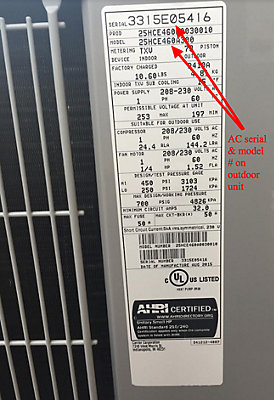How Much Does a Central AC Repair Cost in Denver?
Think your central air conditioner needs a repair?
In Colorado, central AC repair costs can vary greatly.
Of course, what you’ll pay within that range all depends on what’s actually wrong with your unit. And until you have your system professionally diagnosed, you won’t really know how much your AC repair will cost.
But to help you better prepare, we’ll explain the 3 big components of a typical AC repair bill:
- The service and diagnostic fees
- The cost of replacement parts
- The cost of labor
We’ll explain all 3 of those price points above.
Breaking down the cost of your AC repair
1. The service and diagnostic fee
Most HVAC companies charge a service fee (sometimes called a “trip charge”).
This is the fee that the company charges to travel to your home, inspect the AC and gain a better understanding of what’s wrong.
Most HVAC companies also charge a diagnostic fee which is the fee for the tech to look at the issue, possibly hook up gauges, and test the equipment to determine the root issue. But remember, the service fee and the diagnostic fee do not include the cost of the actual repair.
The good news is that some techs/companies will waive the service fee if you choose them to handle the repair. But, of course, that means that if you need a 2nd or 3rd opinion, you’ll need to budget for those additional diagnostic fees.
(Psst...we provide second opinions on AC repairs for FREE.)
2. Replacement parts
If your AC needs new parts, the cost of the replacement part depends on 3 factors:
- The AC part being replaced
- Whether it’s an OEM vs aftermarket part
- Whether the part is covered under warranty
The AC part being replaced
Different parts of the central AC system are priced differently. Usually, motors and more complex pieces (like the compressor or evaporator coil) cost more.
Whether the part is “OEM” or “aftermarket”
OEM (Original Equipment Manufacturer) parts are typically more expensive than “aftermarket” parts.
OEM parts are built by central AC manufacturers (i.e., Trane, Carrier, etc.) and are made to fit a specific make and model of air conditioner. So, if you go with OEM parts, you know that you’re getting a replacement part that will fit just as perfectly as the original part. Plus, choosing OEM parts guarantees that your warranty will stay valid (most manufacturers will void an AC warranty if any aftermarket replacement parts were used for repairs).
Aftermarket parts, on the other hand, aren’t made by manufacturers and are designed to fit in almost any central AC. These parts are sometimes referred to as “universal” parts. If you still have a valid AC warranty, we suggest staying away from aftermarket parts in order to keep your warranty valid.
Whether the part is covered under warranty
Most AC manufacturers provide a parts warranty that lasts somewhere between 2 and 5 years.
This means that any part that fails due to manufacturer defect within 2–5 years from installation will be replaced for free (this does not cover the cost of labor).
The good news is that more and more AC manufacturers are offering much longer warranties (up to 10 years) for higher efficient products.
Not sure if your AC replacement part is covered under warranty? You can check by contacting your manufacturer’s local distribution center and providing them with your AC model or serial number. This is usually found on the outdoor unit (see picture below).

3. Labor
HVAC techs usually either charge an hourly rate or a flat, upfront fee. Usually, though, prices are relatively comparable regardless of the pricing model.
What does affect the cost more than the pricing model is the level of experience and skill of the professional.
The higher the quality of the company/tech, the more they typically charge.
The problem is, though, that some techs will charge higher prices even when they’re not as skilled, reputable or qualified as others. So how do you avoid the trap of paying more than you should for an AC repair?
By making sure that the HVAC company you choose:
- Offers techs who are specialized in AC repairs and are EPA- and Nate-Certified
- Is licensed and insured in the state of Denver
- Offers fair, upfront pricing—in writing
- Can provide 2–3 referrals of past, satisfied customers
Related: 7 Things to Look for in the Best HVAC Contractor in Denver
Need help from a Colorado Plumbing, Heating, Cooling, or Electrical Specialist?
For your convenience, you can request an appointment in one of two ways:
- Call us at (303) 436-2525 for immediate assistance.
- Click on the button below to schedule your appointment online.
Related Reading
Join Our Email Newsletter
Receive updates, current news, promotions, and industry tips.
